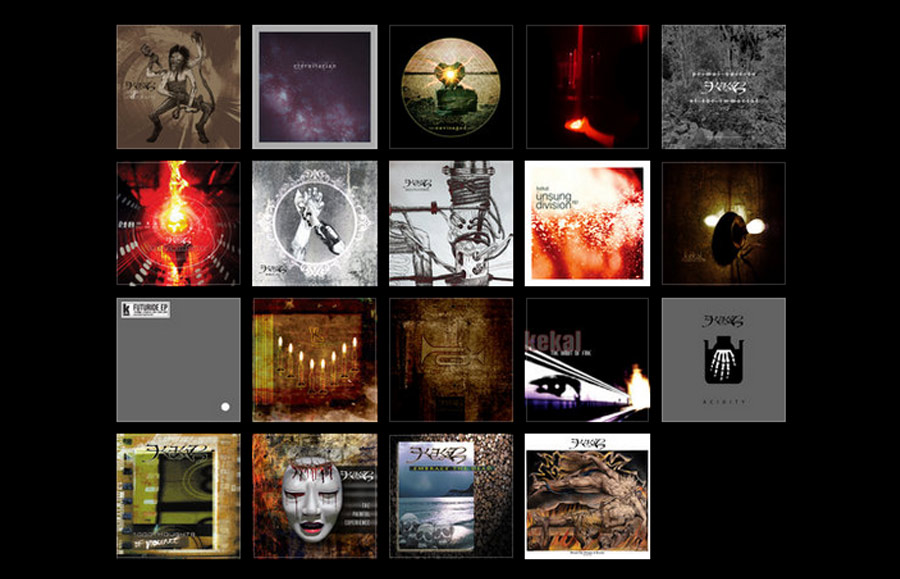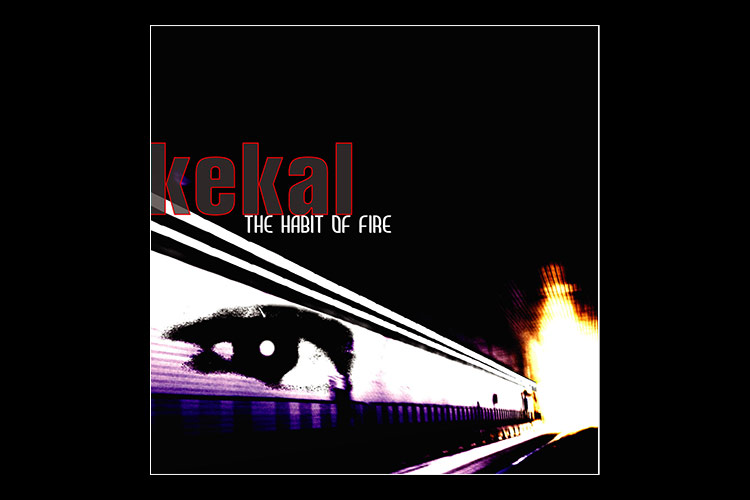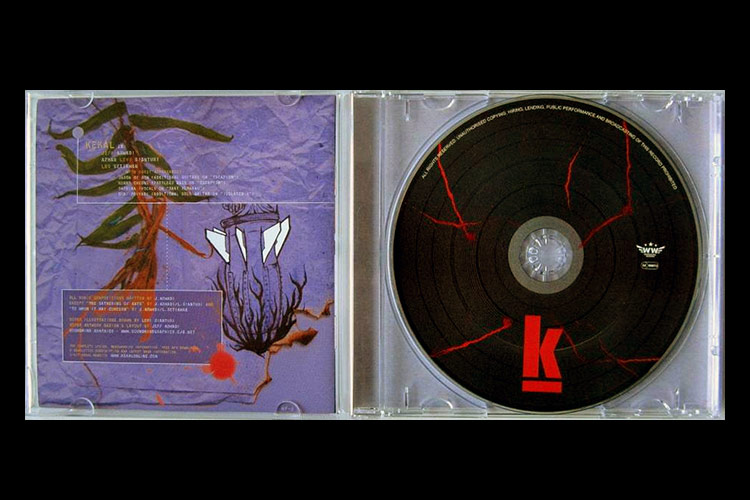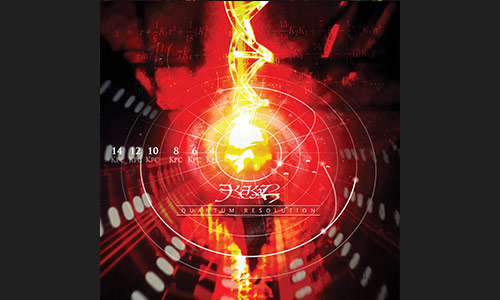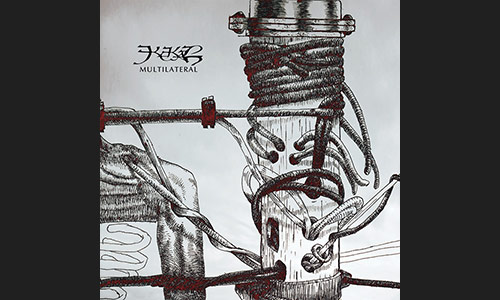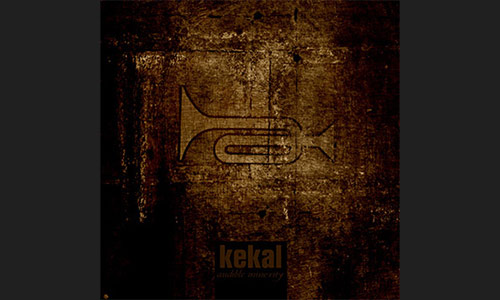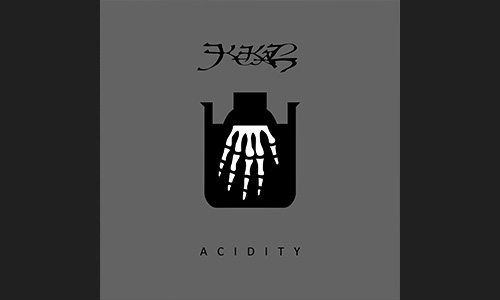The Habit of Fire (2007)
6th full-length studio album
Release Dates
Whirlwind Records, March 15, 2007 (CD, digital)
Open Grave Records, May 15, 2007 (CD, digital)
Track Listing
- Prelude: Worldhate Chronicle
- The Gathering of Ants
- Isolated I
- Manipulator Generals (Part I of Dictatorship)
- Our Urban Industry Runs Monotonously
- To Whom It May Concern
- Free Association
- Historicity and State of Mind (Part II of Dictatorship)
- Postlude: Saat Kemarau
- A Real Life to Fear About
- Escapism
Total Running Time: 70:40
Album Description
"The Habit of Fire" is the band's first and yet most ambitious concept-album so far. Over 70 minutes epic concept album of Urban Avantgarde Metal, incorporating elements from jazz, prog-rock, post-rock, trip-hop, dub, industrial, ambient and experimental electronic music.
It marks as the band's 3rd highest selling album after "1000 Thoughts of Violence" (2003) and "Acidity" (2005). The CD got a mainstream distribution in USA briefly within a year of the album release (2007 - 2008).
Release Note
Released March 15th, 2007 by Whirlwind Records (Germany) in the European territory and some South American countries. Released May 15th, 2007 by Open Grave Records (USA) in the territory of USA, Canada, Japan and Australia.
Credits
Album Line-Up: Jeff Arwadi, Azhar Levi Sianturi, Leo Setiawan
With special guests: Jason DeRon (additional guitar on "Escapism"), Kenny Cheong (fretless bass on "Escapism"), Safrina (vocals on "Saat Kemarau") and Didi Priyadi (additional solo guitar on "Isolated I")
Jason DeRon and Kenny Cheong are members of ALTERA ENIGMA. Didi Priyadi is a member of IN MEMORIAM.
Produced, engineered, and mixed by Jeff Arwadi
Recorded at:
Vision Studio, Jakarta - Indonesia
Studio Vertigo, Melbourne - Australia
Didi's place, Jakarta - Indonesia
Jeff's Mobile Laptop Recording, anywhere else
Mixed at Vision Studio
Mastered by Jeff Arwadi at The Secret Room
Cover artwork & layout by Jeff Arwadi - Soundmind Graphics. Hand-drawn illustration by Levi Sianturi.
Downloading / Purchasing Information
Buy The Habit of Fire Physical
Buy The Habit of Fire Digital
Music Video + Audio Streaming
Insights - Media Reviews of The Habit of Fire
2007
The Habit Of Fire is apparently the sixth album from Indonesian beat combo Kekal, and features such popular favourites as ‘Worldhate Chronicle’, ‘The Gathering Of Ants’ and ‘Our Urban Industry Runs Monotonously’. The band describe it as “an experimental yet accessible 70-minute epic concept album of urban avant garde metal”, which is pretty much on the money. So too is the production and engineering, which marries contemporary (and presumably triggered) blast-beat drums with keyboards, vocoders, and a bewildering range of guitar sounds. Respect is due to the mix engineer who made it all fit in two speakers! There’s a breathless, almost ADD feel to proceedings as the band barrel from one idea to the next, borrowing influences from anything and everything. At the same time, though, their tightness and discipline as a unit is impressive, and you can tell that they’ve been playing together for a long time. The adjective ‘progressive’ has been over-used in music, but Kekal have more right to it than most.
Sam Inglis / Sound On Sound Magazine - CD of the Month
Where to begin with this oddity? The Indonesian band’s sixth album combines black metal, noise rock, progressive rock, and jazz fusion, and is as compelling as it is bizarre. The 70-minute CD is like flipping randomly between radio stations playing Rush, King Crimson, Ulver, and the Mars Volta, yet there’s a cohesiveness that keeps everything from imploding, highlighted by the remarkable, 15-minute “Escapism”. Truly one of a kind.
Adrien Begrand / Popmatters
This is an album that's extremely difficult to categorize...This is an album that's experimental, unusual and completely unique. Most of the songs on the album have an industrial vibe, with a lot of synths and samples. Some of the songs aren't metal at all, with strange electronic melodies and sounds and no real hooks or riffs. They are more like atmospheric soundscapes. But other songs have a lot of metal elements, from melodic guitar riffs to harsh black metal vocals. The songs on The Habit Of Fire have many lengthy instrumental sections and are very progressive sounding. Kekal is constantly changing tempos and textures and challenging the listener to keep up. There are times when the songs get self-indulgent and overly repetitive for me, but when you're pushing the boundaries that's bound to happen. This isn't a CD that will appeal to the masses, but if you've got an open mind and want to hear music that's avantgarde, unusual and experimental, give it a shot.
Chad Bowar / About.com
Kekal has spent 12 years together as a band... Kekal has flirted with jazz fusion, progressive rock, trip-hop, and electronic/ambient elements at various times in their career, and while the band shows some of all of that on The Habit of Fire, the majority of the non-metal influence herein comes from electronic music, including deceptively poppy synth lines. The Habit of Fire really comes off as a collaborative effort between the three men involved; they all contribute both vocals and music which probably is the reason the band is able to pull in so much outside influence with so much cohesion. Throughout the album the band uses a ton of effects pedals and synths as well as other digital production methods, although rather than industrial tones it sounds more like stuff that could have come from an anime soundtrack. The vocals are also quite unique. The main voice is a nasally croon that sounds a bit like Les Claypool with more melody and less madness. In addition, the band also utilizes blackened screaming, some robotic cadences, vocoders, and other various effects which keeps the listener guessing throughout. In all honestly, there really isn't much of anything that is traditionally considered "metal" outside of a few brief flashes of blasting drums, heavily distorted screaming, and occasional chunky metallic riffing, however it would be impossible to say this album isn't heavy. After a brief interlude, "The Gathering of Ants" introduces the band's synth laden attack right from the start, although the song's liberal use of double bass, shifting, heavy riffing, and distorted screaming makes for one of the most "metal" tracks herein. Next up is "Isolated I" which as of right now is my favorite song of 2007. Everything just sort of clicks on "Isolated I"; the whole song flows organically without forcing anything, yet manages to include HUGE catchy choruses with harmonized reverberated vocals, blistering lead guitar work including an impressive solo, complex rhythms, synth leads, vocoders... basically everything in the band's arsenal is on display and it fucking works. "Manipulator Generals (Part I of Dictatorship)" is the first of two tracks that are broken up into movements. Its first being dominated by electronic beats and chanted vocals, while the midsection is an ambient noise excursion that drags on a bit, derailing the momentum the album had been building to this point, but the song is redeemed by a slowly building third movement that takes shape from a simple guitar line and adds dynamic time shifts and noodling lead guitars. "Historicity State of Mind (Part II of Dictatorship)" is the other tune broken into movements, this time only two, the first of which features a mellow proggy groove while the second has a darker trippy feel with heavily manipulated guitar lines and a simple backbeat. The synth beats and guitar tone of the instrumental "Our Urban Industry Runs Monotonously" almost sound like a lost Ratatat song before they add creepy samples to give the song a darker feel. "To Whom it May Concern" is a stripped down, slow burner kind of feel but its simple rhythms are hypnotic and the build sucks you in and eventually releases you. The album ends with "Postlude: Saat Kemarau" another instrumental with clean leading guitars and synths, and perhaps the strangest influence yet pops up in the simple horns that sound straight out of The Cure's playbook. "Free Association" is the only track herein I have a major issue with. It is another slow brooding track, although this one is doesn't ever lure the listener in and just sort of plods along at one pace without changing much through its five minute duration. Had they left out this track and the midsection of "Manipulator Generals" The Habit of Fire would have a much more consistent energy through its duration and knocked about ten unnecessary minutes off the albums mammoth 70-minute duration. As it stands, The Habit of Fire is a progressive, adventurous album that almost transcends the metal tag altogether. It is living proof that music is only limited by the creativity of the artists. If there is any justice in this world, this album will bring Kekal some much deserved attention from fans all over the world.
Tyler Wagnon / Metalreview.com
Few times in my life have I come across a band as fresh and unique as transcontinental Prog Metal band Kekal. Hailing from Indonesia and Canada simultaneously, this is a band that is definitely not afraid of blending genres. Musically speaking, the band is comprised of uber-musicians, more than deftly skilled at their chosen instrument. The combination of tones, atmospheres, rhythms and execution is simply stunning. It’s nearly impossible to break this music down to lowest-common-denominator terms. The music is dark, compelling, heavy, enthralling and bold. Song to song, the band shows great depth and variety. “The Gathering Of Ants” starts things off with a high-energy riff and a healthy dose of musical dexterity, adding industrial overtones before dropping into a strong, Pain Of Salvation-esque verse. “Isolated I” comes off very melodically at its start, even adding an electric piano layer (ala ‘70s Rock) over some cool double-bass drumming. By the time the vocals kick in, the Black Metal influence shows up with some distorted growls behind some cool electronic framework. “Our Urban Industry Runs Monotonously” begins in with an atmospheric, piano laden delivery that Kevin Moore himself would envy, while continuing into a musical landscape of Steve Wilson-like proportions. Each and every song on this album is an awe inspiring piece of work. They don’t sound like any one band, or any one genre. Rather, the members take all of their varied influences and combine them into a grand, musical tapestry. Fans of Porcupine Tree, Chroma Key, Tool, Dead Soul Tribe and Devin Townsend have a new record to track down. In a musical world where the word “progressive” is used all too loosely, Kekal is the real deal.
Shawn Pelata / Digital Metal (Eclipse Magazine)
This is vibrant interesting metal of a decidedly experimental nature. From the first track "The Gathering of Ants" it has you hooked. Ripping melodious but heavy guitar work compliments a variety of rhythmic and vocal approaches all coated in an atmospheric sheen (benefit of background synths/samples as well as a great production). The sheer tonal arsenal at this band's disposal is an aural pleasure, especially coupled with song-writing (a concern often un-addressed by a lot of AGM). The second track features vocoder parts, adding to the decidedly unearthly ambience. Coupled with the growls and the progressive musicianship, there are shades of Cynic as well as later Septic Flesh here, without copying the sound of any one act. And what chops they have!! The axe-work is some of the tastiest I have heard in a while. Over the course of the album, the band's trademark becomes more clear: trippy guitar parts coupled with strange clean vocals, and very occasional industrial growls. "Manipulator Generals (Part I of Dictatorship), shows how far the band has progressed from their more traditional metal roots, with the haunting melodies and alternately eerie arpeggios and dissonant guitars moving forward on the backbone of samplers and drum machines as well as live percussion, going into totally bizarre ill-bient midway, and ending with a truly strange sludge-funk freak-out outro. Strangely the album gets spacier as it progresses. The lyrical and thematical content deals with the political and personal (as far as I could make-out). The eerie vocals couple with the heartfelt motifs to tell the tale. It is original (showing clearly a unique vision from a unique culture, closest reference being some of the more experimental Japanese metal outfits) and emotional (as exemplified by "Our Urban Industry Runs Monotonously"), making for a truly satisfying listen. The heavier more extreme metal elements are few and fluidly interspersed in a sea of musical vitality, the chord changes showing a jazzy flavour as indebted to 70's fusion outfits as to 90's metal (check out "Part II of the Dictatorship"). In places it’s like a prog metal band that has matured enough to let go of the hair/shred metal retentiveness and reaching for the outer limits. The last 2 tracks round off the album with a serenity (the almost BM trip-hop of "A Real Life to Fear About") that can only be born of burning in discontent. In fact the closing epic (almost 15 minutes) may molecularly re-arrange the awareness of the listener into an avant garde metal revolutionary, what with its thematic gist and bizarre twists and turns. All in all, this is genius (a word used too easily, but here completely justified) and is on my personal top-ten list for 2007. And yeah, a big thanks to Chrystof for sending this one my way. Also, don’t forget tot checkout the interview on this very site.
Suleiman / Avantgarde-metal.com
Though I could try, it’d be pointless to hide my dismay at the thought of a black metal-free Kekal, but when they announced that The Habit of Fire would be in a different vein than all previous outings, I simply crossed my fingers and hoped for the best. While the Indonesians’ sixth full-length is heavily steeped in electronica – as their music’s been for some time – it’s more rock than metal on the whole. Nevertheless, it proves a solid listen despite the lessening of aggression and near absence of BM, but is admittedly not up to par with 2005’s Acidity, which could quite be their magnum opus up to this point. Still, ‘The Gathering of Ants’ is a curveball insomuch that no significant changes seem to have occurred in the overall Kekal sound. It is a reasonably heavy tune laced with synth effects and clean vocals – the latter simply competent. ‘Isolated I’ is similar, though I can’t shake the feeling that Rush influenced these guys since I hear faint likenesses during certain sections. The 11-minute ‘Manipulator Generals (Part I of Dictatorship),’ which has three parts itself, is perhaps more in tune with industrial than electronica and also includes a fair amount of noise. Not to be missed either is the 15-minute, five-part ‘Escapism.’ THoF, like many of its individual compositions, samples an array of human emotions and generally has a passage to coincide with each of them, making it a melting pot both style and mood-wise. Lamenting or decrying stylistic changes does no good, and bands that remain unchanged over the years sometimes come dangerously close to stagnation, providing they manage to avoid it in the first place. Like I said earlier, I miss the black metal that often emanated from their earlier works – especially the growls, which are few and far between here – but The Habit of Fire is an interesting release that’ll keep listeners busy at over 70 minutes in length. While Kekal continue to evolve, I must again state that my loyalties do indeed lie with Acidity.
Jason Jordan / Ultimate Metal
Get All Kekal Digital Releases
Get the entire Kekal digital album discography (a bundle of 19 Kekal digital releases sold on Bandcamp including 13 full-length albums and 4 EPs) for only $29 USD. That's a 50% off a-la carte price.
A great way to check out the music of Kekal.
